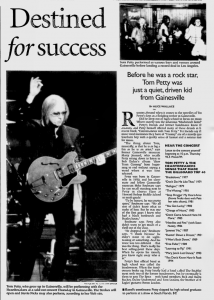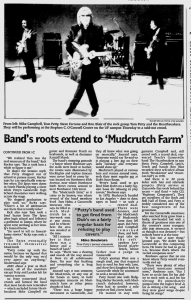Destined for success: Before he was a rock star, Tom Petty was just a quiet, driven kid from Gainesville
By Alice Wallace
Ocala Star-Banner - Wednesday, September 20, 2006
Rumors abound when it comes to the specifics of Tom Petty's day as a fledging rocker in Gainesville.
Did he drop out of high school to focus on music? Where exactly was the infamous "Mudcrutch Farm"? Petty's friends and former bandmates know the answers, and Petty himself offered many of those details in his recent book, "Conversations with Tom Petty." Yet friends say the most vivid memories they have of "Tommy" are of a mostly quiet Southern boy with a quirky sense of humor and a serious mind for music.
"The thing about Tom, musically, is that he is as big a fan as he is an artist," says former Gainesville musician Marty Jourard, who recalls Petty sitting down to listen to Bob Dylan's album "Slow Train Coming" from beginning to end without saying a word when it was first release.
Petty was born in Gainesville in 1950, and his classmate and fellow Gainesville musician Mike Boulware says he can recall standing next to Petty in chorus class at Howard Bishop Middle School in ninth grade.
"To be honest, he was pretty quiet," Boulware says. "We all sort of didn't know what to make of him. But he was one of the first guys I knew who had a black turtleneck and Beatles boots."
Boulware says Petty also didn't get much of a thrill out of the class.
"He dropped out," Boulware says. "I think because he didn't want to do sightreading or something. And his voice was too different -- that was the thing. That's really his big selling-point these days. When he opens his mouth you know right away who it is."
Petty's first official band in high school was called the Sundowners. When the Sundowners broke up, Petty briefly had a band called The Establishment with two of the former Sundowners, but he eventually left them to join The Epics -- with band members Rick and Rodney Rucker, Dickie Underwood and Tom Leadon, the brother of the Eagles' guitarist Bernie Leadon.
"We realized Tom was the real musician of the band," Rick Rucker says. "But it took him a while to figure it out."
To dispel the famous myth that Petty dropped out of school to pursue music, Rucker says he can specifically remember when The Epics were down in South Florida playing a show while Petty's Gainesville High School classmates were walking across the stage.
"He skipped graduation to play with us," Ricky says. "There's a lot of information out there that is totally false."
Rick also says Tom took a brief hiatus from The Epics after high school and followed a girlfriend to Tampa, where he spent time working in her family's funeral home.
"He used to tell us funeral-home stories," Ricky says with a laugh.
The Epics eventually renamed themselves Mudcrutch.
"Petty came up with the name, because we figured that would be the only way we'd ever agree on anything," Underwood says.
After about a year as Mudcrutch, all of the members except Petty and Leadon left for various reasons.
So Petty reinvented Mudcrutch and formed the band that most locals now remember -- which included future Heartbreakers Mike Campbell on guitar and Benmont Tench on keyboards, as well as drummer Randall Marsh.
The band's stomping ground -- a house where Boulware says the walls were lined in leather, the rooms were illuminated by blacklights and topless dancers were never hard to come by was located on Northwest 45th Avenue, near where Northwest Sixth Street curves around to meet Northwest 13th Street.
The "Mudcrutch farm," as it came to be known, was where several of the band members lived. Tom Holtz, a Gainesville musician who says he filled in with Mudcrutch for a two-week stint at one point, said he remembers the area was wooded at the time.
"All I remember is that there was a house and a bunch of land," he says. "There was a clearing and woods all the way around it. Now it's all subdivisions there. I'm sure that building and everything else is long gone."
Jourard says it was common for Mudcrutch, or any one of the bands in town, to hold impromptu concerts on Mudcrutch farm of other prime chunks of land.
"There was a huge hippie movement in Gainesville, and they all knew what was going on musically," Jourard says, "Someone would sya 'So-and-so is playing a free gig on their lawn Tuesday,' and everyone would show up."
Mudcrutch played at various bars and venues around town, with their most regular gig at Dub's Steer Room.
"Petty's band used to get fired from Dub's on a fairly regular basis for refusing to play covers," Boulware says.
In 1970, Mudcrutch headed to Los Angeles -- door to door, tapes in band -- to seek a record deal. There were detours, and the Mudcrutch of Mudcrutch Farm says fell apart. But Petty and Campbell remained closed, and both kept tabs on the soft-spoken keyboard player Tench, whose father was a judge in Gainesville.
Petty's journey West was a rough road, one that required him to send his first wife, Jane, and their first daughter back to Gainesville while he continued to seek a record deal.
Petty sound one with fledging Shelter Records; with Mudcrutch disbanded, however, Petty had to ponder a solo project or find a new band.
He wanted to stay with guitarist Campbell, and, still armed with a record deal, convinced Tench's Gainesville band The Heartbreakers to join them. Petty, Campbell, Lynch, Tench and bassist Ron Blair recorded their self-titled album (with "Breakdown" and "American Girl") in 1976.
And there it is: 30 years laden with hits and solo/side projects (Petty arrives in Gainesville this week behind his recent -- and third -- solo CD, "Highway Companion"). They are members of the Rock and Roll Hall of Fame, and Petty is widely considered one of the best songwriters of his generation.
For the Gainesville musicians who watched Petty grow from a lanky, tow-headed kid with a dream of greatness into one of the country's most recognizable pop musicians, it seemed as though it was destined -- but nobody knew it at the time.
"It was not a sure thing," Jourard says. "He didn't leave Gainesville as this conquering hero. He knew he had to go to L.A., because that's where the record companies were."
Boulware agrees that no one knew where Petty would eventually end up.
"There were plenty of other talented musicians around town," Boulware says. "But I have to credit him for his ability to stick with it, and for his writing. He immediately jumped into the higher level as far as writing a hit song, and they were good songs despite being hit songs."


